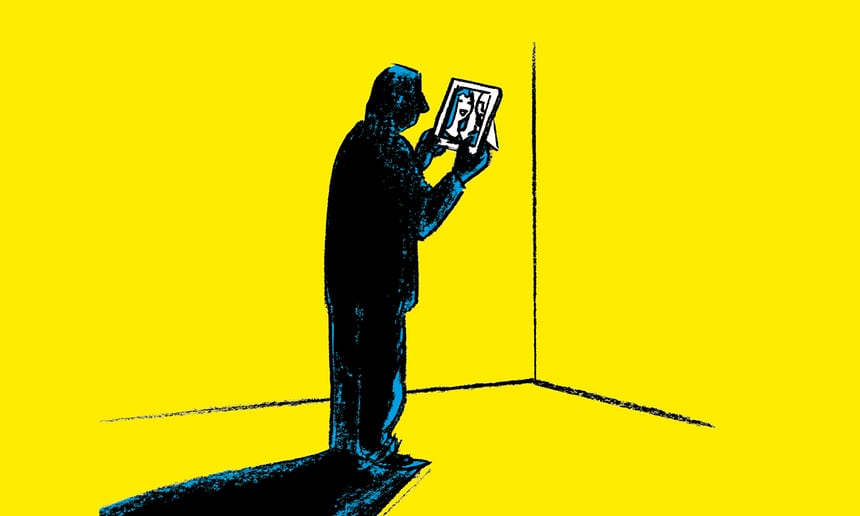Take a look at me: why the thirst for attention - the defining need of our time
The desire to be involved is inherent in all people. Will the understanding of this desire to deal with loneliness, and explain why the stubborn pursuers, mass murderers and jihadists turn their pain on other people?

There is one popular joke about Jewish moms. You probably know her. Question: how many Jewish mummies need to replace a light bulb? Answer: "It's okay, I just sit in the dark, do not worry about me." For the first time, it is funny, because people really behave like this. “Hey, hear me! They shout. - Ignore me! Ignore me! ”
We all need attention no less than food. It is pointless to argue about this and it is easy to understand. But this idea, apparently, is kind of slippery - for we can’t get used to it. If we try to constantly remember that people need attention, it will change our attitude to almost everything they do - from the arts to crimes, from romantic relationships to terrorism. But we must remember this. Only Facebook alone collects and sells the attention of 1.4 billion people daily. This is the fifth of the world's population. It bothers some people, and it is a big change. But we will not know what to do with it until we understand why people need attention.
Attention means that other people think of you - and if once there were people who did not need him, they were already extinct. “Attention is one of the most valuable resources available to social animals,” says Dr. Jeff MacDonald , a psychologist at the University of Toronto who studies interpersonal relationships. “It was literally a matter of life and death. People who felt bad in the company of others, or did not feel discomfort, being separated from the rest, did not have the motivation to perform the actions necessary for the transfer of genes to the next generations. ”
')
In particular, people demonstrate a need for this type of attention, which psychologists call involvement. Abraham Maslov placed the involvement in his famous hierarchy of needs in 1943. In 1995, Roy Baumeister and Mark Leary concluded in their work “ The Need for Involvement ” that research does show that every person has a “strong desire to form and maintain interpersonal affections”. In particular, they determined that involvement means receiving positive attention from well-known people.

And it is not difficult to understand. If someone thinks of you in a positive way, he is more likely to cooperate with you. Or even mate, if you're lucky. But his opinion matters only if he spends a lot of time with you, because it makes his idea of you more accurate, and only exact approval is considered safe. “If you think that you are being admitted for false reasons, this may cause you concern,” says McDonald.
People who are not implicated suffer terribly and have health problems comparable to smoking or obesity . And this is 18% of adults in Britain, of whom 4% report that they always feel lonely, and 14% often. This is the conclusion of last year’s study by the British Red Cross. The number of lonely people in Britain exceeds the entire population of London. Now this problem has become obvious enough for the government to appoint Tracy Crouch, the so-called “ Minister for Loneliness ”.
The word "loneliness" describes well the feeling, but not the reason, which actually has little to do with being alone. According to the report, only 22% of people living alone, feel lonely all the time or often - and this is not much more than the national 18%. Among people aged 16 to 24, on the other hand, this proportion is already 32%. And this should not surprise you. “Usually loneliness depends more on the absence of close connections than on the lack of social contacts,” wrote Baumeister and Liri. Lonely people, in short, lack positive and accurate attention.
So why not ask for that attention? Because attention can only be received in the minds of other people, and you will not receive high-quality attention by force. “In anthropological terms, this is the economics of donation ,” says Dr. Amy Polard of the Mental Health Foundation (FPZ), a charitable organization campaigning against loneliness. “You are creating a bond of reciprocity, from which involvement is derived.” This means that you will only have as much high-quality attention as people want to give you. And if you ask for more - you need attention to yourself - this is a signal that they do not want to give you much attention. It is dishonest and unreliable (people may misjudge you). But the idea that lonely people do not deserve attention is understandable to us instinctively - as in those cases when we see how empty it is in one restaurant, and full of people in another, next to it.
Some lonely people themselves come to the conclusion that they are unworthy of attention, and are moving further away from the world. Others are looking for feelings of belonging and not always the best way. If it is too open to strive for positive attention, you can pass for " narcissus ." If you look for the attention of your relatives, demonstrating your desire to be ignored with your whole appearance, you will end up in a joke about Jewish moms. There are many ways to ask without asking if you are ready to see them. Why, for example, is it not customary to say that people who harm themselves or who suffer from anorexia may want attention? Is this source of pain unworthy of a serious relationship?
One of the ways to get attention is to do something that attracts attention: art, politics, crime, maybe journalism - but the goal seems to be different. And the goal matters. Otherwise, you risk to earn the contempt glory of people, "known for their fame."
When Jamie Dzhuit became a member of the television show "Island of Love" on ITV2 channel in July last year, he suffered from depression. He was a successful model in New York, and then returned to Essex to live with his parents, and didn’t do anything for several years. His family made him take part in the show when he was 27, hoping that this event would bring him out of his daze.
In the modeling business, as Dzhuit explains, drinking coffee, without Instagram, nowhere. “Don't get a job,” he says, “if you don't have followers.” In practice, this is quite simple for a model: feed the appetite of the public with carefully directed photographs. Over time, Dzhuit scored 13,000 followers. He enjoyed their compliments and exchanged messages with some of them. It was like a friendship. “You convince yourself that this is all for real,” he says, “but the difference is so difficult to grasp.” He found himself torn between bursts of activity and guilty silence. “I felt like a hypocrite, a traitor. For the most part because of this, I became miserable. You feel isolated and you don't know why. ”

Upon arrival on the “Island of Love”, all participants must pass smartphones. Inside there are no TVs, tablets, no contact with the outside world. “You have to talk to people,” says Dzhuit. “Recognize them, make friends.” What the audience does not see the show, so it is many hours of active communication. “On our meetings with Camilla, we talked only about books,” remembers Juit, “and none of this went on the air! People don't want to listen to this nonsense, do they? ”
It's funny that for the resumption of real life Dzhuita needed a TV show. “In a couple of days, I could wake up in the morning and feel unreal relief,” he says. - That was incredible. Starting from scratch. It’s sad to know that I could do this at any time in my life without coming to the show. ” Today, she and Camilla are still together, and the participants of the show remain close friends.
Now Juit has 801,000 Instagram folorers, and he basically advertises something useful. And these posts are not very popular. “When I write about something important for me, I lose about a thousand followers,” he says. So far, he has lost about 20,000 of the maximum amount that has accumulated during his participation in the show, and has learned to experience strange satisfaction from this process. “I don’t need anything else,” he says, “because I want my followers to know who I am and love me because I am. I try to show a more realistic version of myself. ”
The charm of social networks is that there, unlike real life, there is a time for lies. The opportunities for obtaining a positive impact are enormous, but you have to pay for it with precision. “When you present the edited version of yourself to the world, any approval you get does not apply to you entirely,” says McDonald. As Dzhuit discovered, it erodes your sense of belonging.
We still do not know whether social networks make people lonely . Even so, you need to remember that they are also suitable for supporting an existing friendship. But in a survey conducted last month, the FPZ found that 30% of young Scots believe that social networks cause them to feel isolated. The report from the 2015 International Program for the Assessment of Educational Achievement of Students (English Program for International Student Assessment, PISA) shows a sharp drop in the number of children in developed countries since 2012, claiming that they "easily make new friends at school." The people who use the Internet most of all often speak about the feeling of being alone - however, we do not know what is the reason and what is the consequence. Also, we do not know what percentage of time they spend on social networks.
Even if time is off-line and useful for you, it can also lead to stress, as a result of which people decide to hide behind their screens. “I always tell my students,” says McDonald, “it’s a pity that in real life we don’t have a 'backspace' button. But it is not. Once said can not be undone. Such control is not available to us. " In other words, until recently, most people were too clumsy in social terms to seem like someone else.

For some people, especially those who have had difficulty growing up, this stress can be unbearable. The deep-rooted notion that they are unworthy of good creates loneliness and a thirst for attention, which they are trying to satisfy. In particularly desperate cases, they even try to force other people to notice them, believing that hate is better than indifference. These people are unhappy and can be dangerous. They go to crime for the sake of attention.
In a broad sense, stubborn pursuers ( stalkers ) are of two kinds. “One of them is in search of intimate relationships,” said Dr. Brian Spitzberg , a leading specialist in stalking at San Diego State University. “They are trying to return the person who rejected them.” Such people are often in a relationship with their victim, and cannot accept their ending. “They are confident that they need this person. They feel injured and rejected, but this is all due to the craving for attention they deserve. ”
He calls another type "persecutors of public persons". They are usually strangers personally with their victim, but they bother them in order to achieve some kind of goal. “They need something to happen - something that, in their opinion, public figures do not do,” says Spitzberg. “Some of them need someone influential to pay attention to them.”
Stalkers often suffer from loneliness. However, attention seeking is not often considered their main motive. Stalker's desires seem obvious: to become part of the victim's life. Their behavior is irrational; it only repels their sacrifice from them, but the stalker continues to insist that the woman (and in three quarters of the cases the victim is a woman) change her mind, or continue her attempts to take revenge. And he, of course, becomes a fairly large part of the victim's life.
In addition to solid refusal, most experts recommend ignoring the stalker. They act on the basis of a presentation that Spitzberg describes as “any attention is all the same attention”. Given this, the behavior of stalkers already seems half rational for a person desperately seeking a sense of belonging. Of course, most stalkers are mentally healthy - at least according to a psychiatrist. According to Spitzberg, in no more than 30–50% of the cases of stalking that ended in criminal cases, it was possible to make a clinical diagnosis. And among stalkers who crave intimate relationships, this percentage is even smaller. “Most of the cases of stalking where people sought intimate relationships are practically alien to none of us,” says Spitzberg, “if we meet the wrong person in the wrong circumstances.”
Unfortunately, it seems to some people that they are not just ignored by their former partner, but expelled the whole world. For them, life is almost without attention - pure torture. A recent study of the working environment in Canada found that people treat ostracism worse than negative attention or aggressive behavior. The work of Professor Kip Williams of Purdue University in Indianapolis shows how ostracism hurts and can lead to asocial behavior. Another study by Mark Leary shows that this is a key factor leading to school shooting.
Like stalking, such a crime seems completely irrational. Usually it is enough to characterize the killer as a pissed or insane person. But they are always lonely. Mass killers like to leave notes explaining their feelings. Cho Seung-hee (mass shooting at the Virginia Polytechnic University in 2007) stated that he had encountered aggressive behavior, which surprised people who knew him. Elliot Roger (Islay Vista, 2014) wrote: "I felt depressed because I wanted sex, but I felt I was not worth it." Between them, the grotesque sense of belonging is often manifested. Lee Wester Flanagan (Monita, 2015) was a Cho fan. Matti Juhani Sari (Kauhajoki, 2008) and Pekka-Erik Auvinen (high school Jokela, 2007) exchanged videos on YouTube. Auvinen quoted the manifesto of the “martyrs Eric Harris and Dylan Klebold ” (Columbine School, 1999), who also inspired Todd Cameron-Smith (Albert 1999), Adam Peter Lanza (Sandy Hook School, 2012) and everyone else. Naturally, if they had not killed anyone, we would have paid less attention to their feelings.
There was a time when there were almost no massacres. The weapon was. Bombs, knives and vans were. There were cruel, sick people. In today's world, on average, less violence than before. However, mass killings are becoming more. A study by the Harvard School of Public Health found that in the US, massacres with at least four victims between 1982 and 2011 occurred on average every 200 days. Then, in the period from 2011 to 2014 - on average, every 64 days. Eighteen of the thirty murders with the highest casualties in the United States since 1949 have occurred in the last 10 years, including the five worst.
How else to call these crimes, except for crimes on the basis of lack of attention? They were filmed on cameras, then on phones. Watched live around the world. They are stored on Wikipedia and YouTube for posterity. Where could one find a copy of the killer’s manifesto in 1990, except on video? The truth is that if you strongly want the world to pay attention to you, you can achieve this even tomorrow. It is easy. And before the advent of the Internet, it was more difficult.
Jihadists also love to leave their speeches, but claim more elevated motives. Their massacres, they say, are part of a plan to achieve paradise and the triumph of their beliefs. But few of them had a life as pious as the goals for which they died. Shezad Tanvir , one of those who detonated bombs in the London Underground in 2005, secretly met a girl . Amedy Coulibaly , who attacked a kosher store in Paris, kept pedophile materials on a computer . Judging by the interview of the Demos analytical center with 62 former jihadists in 2010, they "had a more simplistic, shallow idea of Islam than the radicals who did not resort to violence." Does it seem likely that they resorted to violence because of their commitment to holy books? Or is it more likely that their violence, which is obsessed with peace, was fueled by a thirst for attention, which they gave out as fanaticism?
It’s hard to imagine how crimes of neglect can disappear, but recognition of their nature can help. Perhaps then we will stop rewarding the behavior of criminals with the amount of attention they seek. There are other simple solutions to the attention crisis. Various activities aimed at increasing socialization can improve access to quality attention, helping people to get to know each other better. As a result, we can come to the conclusion that people will be required to comply with the minimum weekly norms of communication offline. If we talk more freely about our search for attention, then perhaps we will finally receive the attention we are seeking.
Source: https://habr.com/ru/post/410821/
All Articles